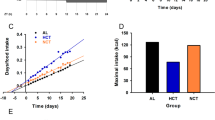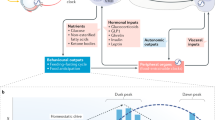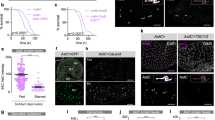Abstract
Objective:
Peptide YY3-36 (PYY3–36), glucagon-like peptide-1 (GLP-1), oxyntomodulin and cholecystokinin (CCK) are gastrointestinal-derived hormones that are released postprandially in proportion to the amount of calories ingested. All significantly reduce food intake following peripheral administration to rodents. We have investigated the effect of handling, exposure to a novel environment or to environmental enrichment on the anorectic effect of these gut hormones.
Results:
Results suggest that the transfer of a rat into a novel environment (cage change) inhibits the anorectic response to peripherally administered PYY3–36 and oxyntomodulin (1 h food intake reduction (% saline control): PYY/home cage 82.3±5.9%, P<0.05; PYY/clean cage 103.4±9.7%; oxyntomodulin/home cage 71.6±12.1%, P<0.05; oxyntomodulin/clean cage 103.0±8.5%) and attenuates the anorectic response to GLP-1 and CCK (1 h food intake reduction (% saline control): GLP-1/home cage 68.8±6.4%, P<0.01; GLP-1/clean cage 80.0±9.3%; CCK/home cage 49.8±6.2%, P<0.001; CCK/clean cage 69.4±10.6%, P<0.05). We have also observed that exposure to a novel environment does not alter anorectic effect of peripherally administered melanocortin 3/4 receptor agonist, melanotan II (MTII) (1 h food intake reduction (% saline control): MTII/home cage 32.0±6.3%, P<0.001; MTII/clean cage 24.8±4.2%, P<0.001). The attenuation in food intake observed following exposure to a novel environment can be attributed, in part, to a significant reduction in the food intake of the saline treated animals. In a further study, the anorectic effect of peripherally administered PYY3–36 is attenuated in unhandled rats (88±4.2% saline control, P=ns) or rats exposed to environmental enrichment (103.3±9.7% saline control, P=ns), but not in animals that were handled extensively prior to the study (80.1±7.3% saline control, P<0.05).
Conclusion:
These studies highlight the importance of handling, acclimatisation and habituation of rodents to experimental conditions prior to investigating the ability of gut hormones to alter food intake.
This is a preview of subscription content, access via your institution
Access options
Subscribe to this journal
Receive 12 print issues and online access
$259.00 per year
only $21.58 per issue
Buy this article
- Purchase on Springer Link
- Instant access to full article PDF
Prices may be subject to local taxes which are calculated during checkout



Similar content being viewed by others
References
Adrian TE, Ferri GL, Bacarese-Hamilton AJ, Fuessl HS, Polak JM, Bloom SR . Human distribution and release of a putative new gut hormone, peptide YY. Gastroenterology 1985; 89: 1070–1077.
Grandt D, Schimiczek M, Beglinger C, Layer P, Goebell H, Eysselein VE et al. Two molecular forms of peptide YY (PYY) are abundant in human blood: characterization of a radioimmunoassay recognizing PYY 1–36 and PYY 3–36. Regul Pept 1994; 51: 151–159.
Pedersen-Bjergaard U, Host U, Kelbaek H, Schifter S, Rehfeld JF, Faber J et al. Influence of meal composition on postprandial peripheral plasma concentrations of vasoactive peptides in man. Scand J Clin Lab Invest 1996; 56: 497–503.
Batterham RL, Cowley MA, Small CJ, Herzog H, Cohen MA, Dakin CL et al. Gut hormone PYY(3–36) physiologically inhibits food intake. Nature 2002; 418: 650–654.
Dakin CL, Small CJ, Batterham RL, Neary NM, Cohen MA, Patterson M et al. Peripheral oxyntomodulin reduces food intake and body weight gain in rats. Endocrinology 2004; 145: 2687–2695.
Cohen MA, Ellis SM, Le Roux CW, Batterham RL, Park A, Patterson M et al. Oxyntomodulin suppresses appetite and reduces food intake in humans. J Clin Endocrinol Metab 2003; 88: 4696–4701.
Flint A, Raben A, Astrup A, Holst JJ . Glucagon-like peptide 1 promotes satiety and suppresses energy intake in humans. J Clin Invest 1998; 101: 515–520.
Moran TH . Cholecystokinin and satiety: current perspectives. Nutrition 2000; 16: 858–865.
Tschop M, Castaneda TR, Joost HG, Thone-Reineke C, Ortmann S, Klaus S et al. Physiology: does gut hormone PYY3–36 decrease food intake in rodents? Nature 2004; 430: 1.
Gura T . Obesity research. Labs fail to reproduce protein's appetite-suppressing effects. Science 2004; 305: 158–159.
Duke JL, Zammit TG, Lawson DM . The effects of routine cage-changing on cardiovascular and behavioral parameters in male Sprague-Dawley rats. Contemp Top Lab Anim Sci 2001; 40: 17–20.
Saibaba P, Sales GD, Stodulski G, Hau J . Behaviour of rats in their home cages: daytime variations and effects of routine husbandry procedures analysed by time sampling techniques. Lab Anim 1996; 30: 13–21.
Halatchev IG, Ellacott KL, Fan W, Cone RD . Peptide YY3–36 inhibits food intake in mice through a melanocortin-4 receptor-independent mechanism. Endocrinology 2004; 145: 2585–2590.
Acknowledgements
CRA is funded by the Wellcome Trust. KLS and JRCP are funded by the MRC. The department is funded by MRC and Wellcome programme grants and supported by an EU consortium grant.
Author information
Authors and Affiliations
Corresponding author
Rights and permissions
About this article
Cite this article
Abbott, C., Small, C., Sajedi, A. et al. The importance of acclimatisation and habituation to experimental conditions when investigating the anorectic effects of gastrointestinal hormones in the rat. Int J Obes 30, 288–292 (2006). https://doi.org/10.1038/sj.ijo.0803137
Received:
Revised:
Accepted:
Published:
Issue Date:
DOI: https://doi.org/10.1038/sj.ijo.0803137
Keywords
This article is cited by
-
A systematic review of the development and application of home cage monitoring in laboratory mice and rats
BMC Biology (2023)
-
Peptide Tyrosine Tyrosine 3-36 Reduces Meal Size and Activates the Enteric Neurons in Male Sprague–Dawley Rats
Digestive Diseases and Sciences (2017)
-
Mass spectrometry-assisted confirmation of the inability of dipeptidyl peptidase-4 to cleave goldfish peptide YY(1–36) and the lack of anorexigenic effects of peptide YY(3–36) in goldfish (Carassius auratus)
Fish Physiology and Biochemistry (2016)
-
Stress inhibits PYY secretion in obese and normal weight women
Eating and Weight Disorders - Studies on Anorexia, Bulimia and Obesity (2016)
-
Accurate Measurement of Body Weight and Food Intake in Environmentally Enriched Male Wistar Rats
Obesity (2011)



